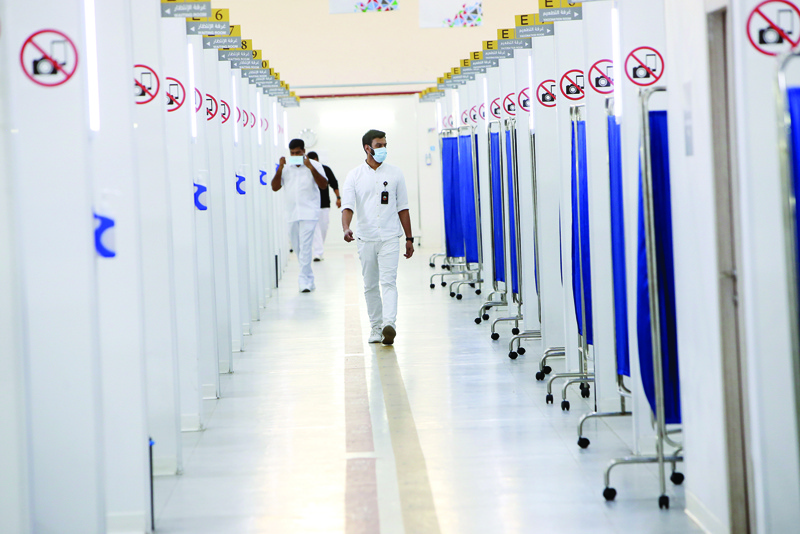 KUWAIT: Medical workers, wearing face masks, walk at the Kuwait Vaccination Center in Mishref yesterday. - Photos by Yasser Al-Zayyat
KUWAIT: Medical workers, wearing face masks, walk at the Kuwait Vaccination Center in Mishref yesterday. - Photos by Yasser Al-ZayyatBy Ben Garcia
KUWAIT: As Kuwait enters the fifth and final phase to ease restrictions and return to normalcy, several people are still deliberating whether to stop wearing facemasks in open spaces. "I don't want to get rid of my facemask yet - we need it for our safety. I will only take my mask off when the government declares that we are free from the coronavirus, as we still have cases registered on a daily basis," said Mariel, a Filipina visiting the old souq in Salmiya, otherwise known as the 'Barayeh Salem', with her husband and daughter. "It is better to be safe than sorry," she added.
Indian resident Julius said he wasn't aware about the new rule of not wearing masks in open areas. "It's become a habit for us to wear a mask before leaving our homes," he said. Amid a decline in COVID-19 infections, Kuwait returned to normalcy from Sunday, with various sectors returning to full capacity. Kuwait airport resumed operations at full capacity and worshippers in mosques are now praying without distancing, although social distancing is still in force in closed places such as shopping malls, restaurants and cafes. Conferences and wedding parties are also allowed, provided attendees are fully vaccinated.
 A student, wearing a facemask, shows off her vaccination card after receiving her second dose of the COVID-19 vaccine at the Kuwait Vaccination Center in Mishref yesterday.
A student, wearing a facemask, shows off her vaccination card after receiving her second dose of the COVID-19 vaccine at the Kuwait Vaccination Center in Mishref yesterday.The Cabinet has also asked the ministry of interior and Public Authority for Manpower to start issuing all types of visas to people vaccinated with approved vaccines (Pfizer-BioNTech, Oxford-AstraZeneca, Moderna and Johnson & Johnson), but relevant authorities are still waiting for further instructions.
For over 20 months, Kuwait made it compulsory for people to wear masks and maintain social distancing at outdoor and indoor venues. Gatherings were prohibited and worshippers at mosques and churches had to abide by health ministry protocols of wearing facemasks and maintain social distancing.
A five-phase gradual plan to return to normalcy was announced in April. The first phase included a partial curfew coupled with a lockdown of Farwaniya, Khaitan and Hawally because of a surge in cases. Activities that resumed operations in the first phase included restaurants' deliveries, telecommunication companies, food retailers, transportation of employees, gas stations, private clinics and auto workshops.
The second phase saw curfew shortened to between 9 pm and 6 am. In this phase, employees in government and private sectors were at 30 percent attendance, in addition to resumption of work in the construction sector and banks. Malls opened for eight hours, along with parks and restaurant takeaways.
The third phase saw an end to the curfew, while health authorities assessed the situation of areas under lockdown. Workplace attendance increased to 50 percent and visits to social care homes was allowed, as well as reopening of hotels, resorts and hotel apartments. Taxis were also allowed to operate with only one passenger, and mosques were allowed to hold Friday prayers.
An increase in workplace attendance and dine-in at restaurants was announced in phase four, but with restrictions, and public transportation resumed but with distancing. All activities resumed in phase five, the government and private sectors returned to normalcy, families can get together, and weddings and graduation ceremonies are allowed.
The first confirmed coronavirus case in Kuwait was announced on Feb 24, 2020 -a 53-year-old Kuwaiti who reportedly visited Iran. Before the day ended, the government had detected five cases. The following day, another four cases were detected, and on Feb 26, the government announced 25 cases. Yesterday, Kuwait recorded only 21 cases, the lowest since the outbreak of the pandemic in the country. Kuwait has a total population of 4.2 million people, and according to government records, around 3.5 million people have been vaccinated, both citizens and residents.








